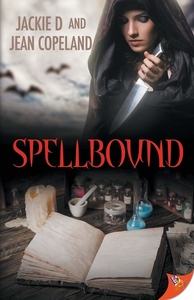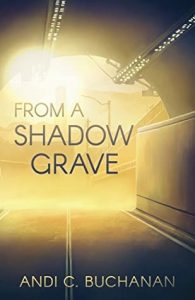“Hazel Abbot spent her whole life unaware she was a witch. When a spell thrusts her great-aunt Sarah Hutchinson forward from the Salem witch trials of 1692 and lands her in Hazel’s bookstore, everything Hazel thought she knew about herself changes…”
If you want a read that’s fast-paced, fun, and filled with well-rounded and likeable characters, look no further than Spellbound, a perfect blend of paranormal action and lesbian romance.
We start directly in the middle of the action, with protagonist Raven Dare—sexy, solemn and mysterious in equal measure—doing what she does best: hunting demons. Armed with gold knives and a wit that’s just as sharp, Raven kicks butt whilst quipping about American Idol, and it’s all in a day’s work for this demon hunter with a tortured past.
In a story about time-travel, supernatural monsters and women-fearing cults, it is the characters in Spellbound that are the true heart of the novel. There are a great many interesting dynamics at play between the central cast, and as a reader, you’re immediately drawn to them. The four main women are strong in their own ways, and their interactions are alternately warm, fierce and sizzling with tension. It’s great to see them clashing with the main villains of the novel, but just as fun to see them in their downtime, and there’s plenty of both due to the novel’s excellent pacing.
Sarah is great fun; immediately likeable and not one to take her strange circumstances sitting down, she takes agency and adapts to the world she’s living in, though finding it bizarre at times. Hazel, too, takes up her new mission with an admirable courage, spurred by the attraction she feels towards Raven. Morgan is aloof, sarcastic, but caring underneath. There are two main love stories in Spellbound, and though different in tone, both are equally compelling.
My favourite thing about this book is how down to earth it is, whilst dealing with the supernatural. Vivid descriptions of car rides, plane journeys and cities build up the real world, juxtaposed with fights against demons and monsters; the authors do a great job of nailing magical realism.
To that end, too, the villains of the story are rooted in very real prejudice despite their paranormal nature: whilst the protagonists clash with banshees and hellhounds, the writers don’t shy away from the fact that the real evils of this tale are prejudice, a fear of women and their strength, and a need to subjugate others for one’s own gain. The supernatural elements of Spellbound are a great vehicle for a story that’s ultimately about overcoming these things, celebrating the strength of women and doing what’s right.
This is such a fun read, with excellent pacing, engaging romance and a realistic, compelling cast of characters.
Rating: *****


